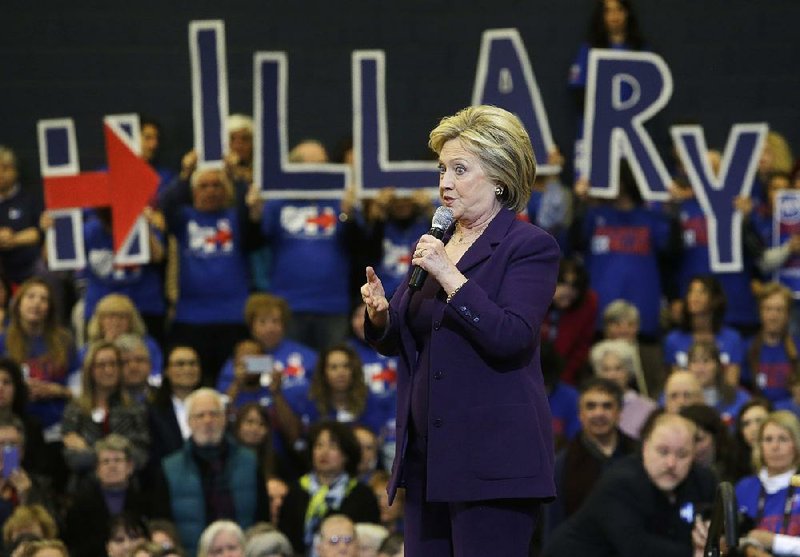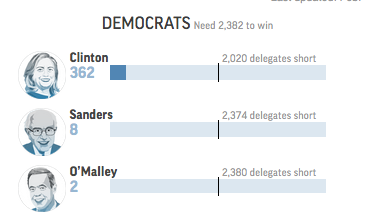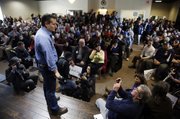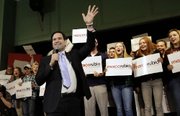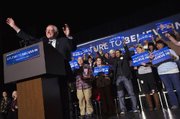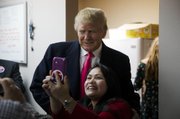NASHUA, N.H. -- Hillary Clinton tried to turn a slim victory in Iowa into wider momentum for her Democratic campaign, and Ted Cruz sought to lock in his spot at the top of the Republican field as the presidential candidates packed up Tuesday for New Hampshire.
RELATED ARTICLES
http://www.arkansas…">Huckabee exit shuffles deck for his backers in statehttp://www.arkansas…">For Iowa, polls take 1 drubbing
The contenders descended on the Granite State -- along with scores of volunteers and staff members -- and quickly scattered for a blitz of campaign rallies and television interviews. Some sought to capitalize on the results of the Iowa caucuses, while others looked to put the best face on poor showings as they settled in for Tuesday's New Hampshire primary and beyond.
Clinton celebrated her narrow win in the lead-off caucuses and said she expected a tough fight in New Hampshire, noting she'll be campaigning in the "backyard" of Vermont's Bernie Sanders, where he has been running strong for weeks.
Sanders celebrated his strong showing in Iowa, landing at dawn in Bow and addressing a hardy group of supporters who met him. "We're in this for the long haul," he told reporters as his plane flew overnight to the season's second showdown.
Clinton defeated Sanders by less than 0.3 percent of the vote, the closest in Iowa Democratic caucus history, the state party said. Sanders said his campaign still was reviewing the results and did not concede.
Still, Sanders' campaign declared victory even in defeat, saying the results were a "giant step" in proving he was a viable candidate.
"The significance is that for folks who did not think Bernie Sanders could win, that we couldn't compete against Hillary Clinton," Sanders said as he arrived in New Hampshire on Tuesday. "I hope that that thought is now gone."
Clinton, meanwhile, played up her win -- no matter how narrow -- while setting expectations for a difficult road ahead.
Rallying supporters in Nashua, she urged voters to get practical and ask themselves when they hear candidates' promises, "Does this just sound good on paper or does this get done? And who is most likely going to be able to deliver?"
fence-sitting voters
On the Republican side, Cruz's win showed that the U.S. senator from Texas is adept at mounting a powerful grass-roots operation. Donald Trump, the billionaire businessman who has dominated the polls for weeks, took second place. Finishing a close third, Marco Rubio was catapulted to the top of establishment candidates vying to be the party's preferred alternative to Trump or Cruz.
For Republicans, the pivot to New Hampshire means the still-crowded cast of candidates has turned toward a mostly undecided electorate.
New Hampshire historically has favored more moderate candidates than Iowa, and more than 40 percent of the state's voters are not registered in any political party, giving them the power to choose which party's primary to vote in. Polls show that more than half of GOP voters have yet to make up their minds.
Unlike past candidates who found success in Iowa but fizzled fast, Cruz argued Tuesday that his campaign has staying power, resources and broad appeal.
He said that unlike recent Iowa winners, he has the resources to compete nationally. "We are answering the questions of the men and women of New Hampshire and earning the votes one person at a time," Cruz told MSNBC.
Separately, Cruz touted on CNN the power of "the conservative grass roots."
"There is a silent majority in this country," Cruz said. "This is center-right country. This is a country built on Judeo-Christian values. And the heart of my campaign is based on common-sense principles."
As his campaign kept one eye on New Hampshire, the other was on South Carolina. Cruz was to host an evening rally in Greenville, S.C., before returning to New Hampshire.
And then there is Trump, who despite stealing the spotlight and driving the debate for months, was outdone by Cruz in Iowa.
On Tuesday, Trump blamed the media for dismissing his "long-shot, great finish."
"Because I was told I could not do well in Iowa, I spent very little there -- a fraction of Cruz & Rubio. Came in a strong second. Great honor," Trump tweeted.
He also criticizing the media for not giving him credit for receiving the second-highest vote count in Republican caucus history. At the same time, he also said voters did not give him enough credit for funding his own campaign. "I will keep doing, but not worth it!" he wrote.
Trump picked up the endorsement of former U.S. Sen. Scott Brown of Massachusetts at rally Tuesday in Milford, N.H.
Rubio, too, is banking on support from New Hampshire. "I give the party the best chance not just to unify the conservative movement but to grow it," Rubio said on ABC News' Good Morning America. "We're ready to go in New Hampshire, and we're excited about the momentum we're carrying into this great state."
Speaking to supporters Tuesday night in Exeter, Rubio said no other state "demands more of candidates than New Hampshire does."
In a sign of his momentum, his campaign announced an endorsement from U.S. Sen. Tim Scott of South Carolina, the only black Republican in the Senate.
Rubio's advisers began casting the GOP race as a three-man contest -- an attempt to box out the other contenders vying for mainstream Republicans.
That won't be easy. Ohio Gov. John Kasich, former Florida Gov. Jeb Bush and New Jersey Gov. Chris Christie on Tuesday stormed into New Hampshire with packed campaign schedules. All three are hoping the state will breathe life into their campaigns.
"I'm operating on the sunny side of the street," Kasich told CNN on Tuesday. "It's going to take me telling people who I am. And at the end of the day, people want somebody who can land the airplane."
Early Tuesday, Christie was on the stump in Nashua, delivering the keynote speech at the Salvation Army's annual Groundhog Breakfast. Christie appeared undeterred by his 10th-place finish in Iowa as he tried his hand at punditry.
"I am pleased to announce that I performed exactly as I expected in Iowa," Christie told a questioner who asked his view on last night's results, adding that Iowa was in the "rearview mirror."
close, but hard-fought
House Democrats downplayed the near tie between Sanders and Clinton.
"Hillary Clinton came out on top," said House Democratic Caucus Chairman Xavier Becerra, D-Calif. "It was a close victory, and as she said, it was hard-fought."
Becerra, who endorsed Clinton in August, compared her slim margin over Sanders to the Denver Broncos' two-point win over the New England Patriots that secured Denver a spot in the Super Bowl. He said that at the end of the day, it didn't matter if it was a close game or a close election, the Broncos will play in the big game and he believes Clinton will be in the general election.
"In this case, it is all about winning the Super Bowl of elections," Becerra said. "At the end of the day, what people remember is who wins and who ultimately becomes president."
But the sports metaphor isn't entirely correct, as neither the Iowa caucuses nor the Democratic presidential primary is a winner-take-all system -- instead, delegates are distributed based on the a candidate's percentage of the vote. That means that Clinton and Sanders could ultimately capture a similar number of delegates in Iowa.
But a day after her virtual tie with Sanders in the first-in-the-nation contest, Clinton's supporters -- she has received the vast majority of congressional endorsements -- rallied around her and insisted they always expected a close Democratic race.
Democrats in the Capitol who back Clinton were careful not to disparage Sanders, and even cheered the energy and enthusiasm that his supporters bring to the campaign.
"I think yesterday's contest also laid to rest a myth about the Democrats that there is an enthusiasm gap," said Rep. Jan Schakowsky, D-Ill.
Every Democrat who spoke about the photo finish credited Sanders for helping motivate young voters to turn out.
"In the end, Sen. Clinton will benefit from that when she is running in the November elections against whoever may be the Republican nominee," said House Democratic Caucus Vice Chairman Joe Crowley of New York.
Rep. Rosa DeLauro, D-Conn., said Clinton can win by showing she's "a progressive who gets things done" -- and by outlining specific policies for expanding opportunities for middle-income workers, increasing access to health care and improving education across the country. They don't think she should shift gears despite Monday night's nail-biter.
"The message remains the same," DeLauro said.
And her supporters don't expect Clinton to start attacking Sanders, whose public congressional backing at this point comes from Reps. Keith Ellison of Minnesota and Raul Grijalva of Arizona, co-chairmen of the Congressional Progressive Caucus.
Clinton was careful to praise Sanders in her Iowa speech, calling him a "great public servant" and drumming up excitement for a series of recently announced one-on-one debates between them.
"I am excited about really getting into the debate with Sen. Sanders," Clinton said in her speech. "In the last few weeks, we finally began to have what is one of the most important, substantive conversations that the Democratic Party could have."
Information for this article was contributed by Kathleen Hennessey, Lisa Lerer, Ken Thomas, Kathleen Ronayne, Steve Peoples and Bill Barrow of The Associated Press; by Alan Rappeport, Steve Eder and Trip Gabriel of The New York Times; and by Kelsey Snell of The Washington Post.
A Section on 02/03/2016
